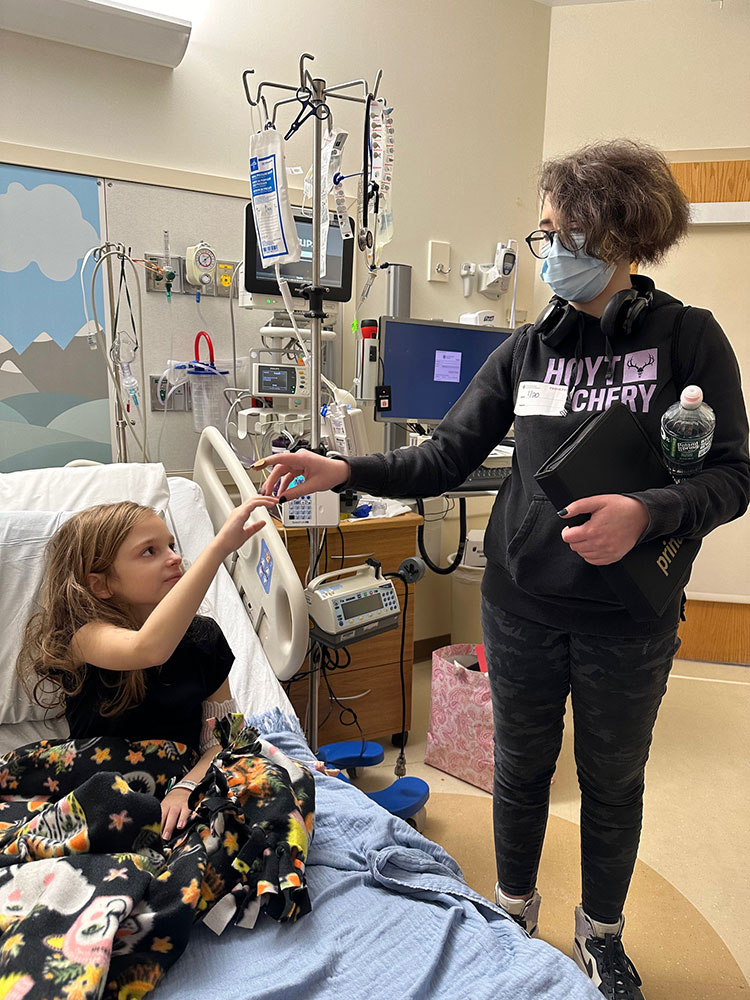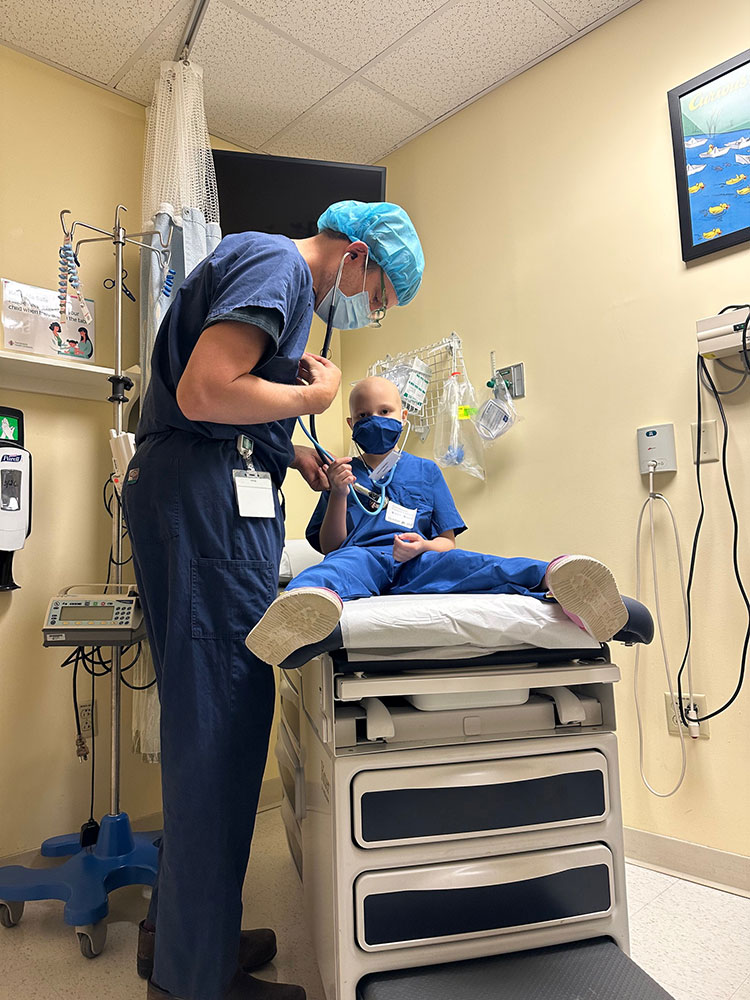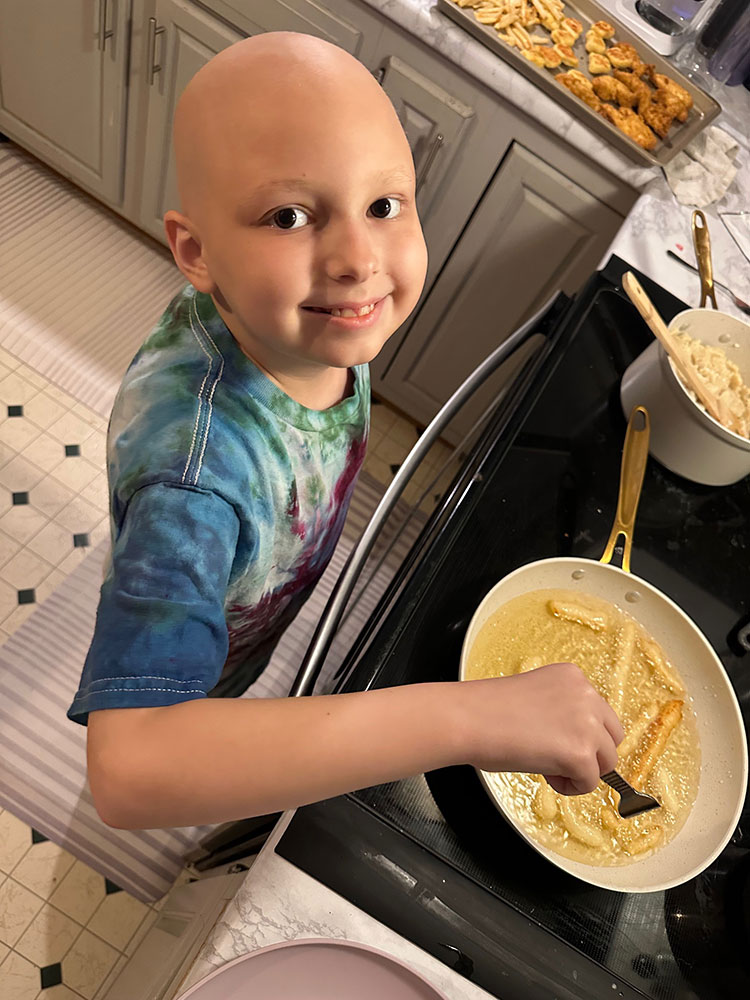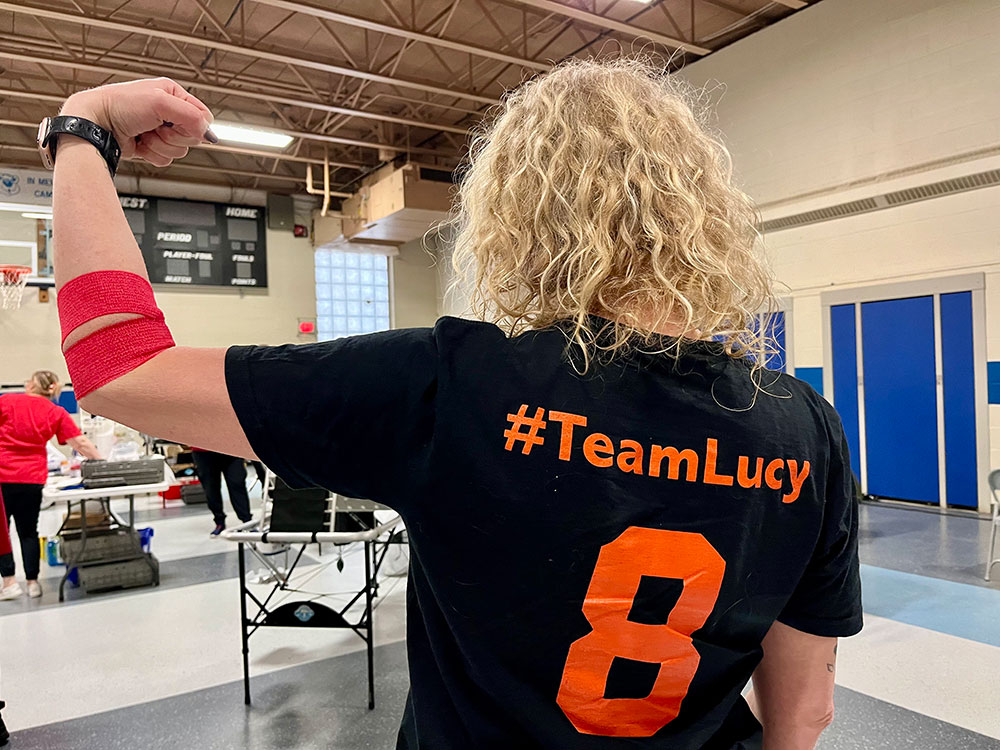
By Jennifer Costa, regional communications director
“Last January 2024, Lucy was a normal, healthy, awesome, chatty little girl.”
New Hampshire mom Chrissy Roberge knows firsthand how life can change in an instant. Fifteen months ago, her spunky, active eight-year-old suddenly developed intermittent fevers that wouldn’t go away.
“She wasn’t really getting sick,” Chrissy said. “But she was very pale and really, really tired.”
“Lucy is the youngest kid out of the group of kids in the neighborhood,” said Lucy’s dad, Ivan Bellemare. “If anyone’s ever run in a gang of neighborhood kids, there’s always a little brother or sister that’s trailing behind by about 50 feet chasing after the group.”


Her parents say: that was Lucy – always on the run and always full of energy. So much so, it earned her a neighborhood nickname.
“Our neighbor would look out his window and see Lucy with her arms thrown back running,” Ivan explained. “She was under the delusion that it made her more aerodynamic to catch up with her friends.”
From then on, she was the neighborhood’s beloved “Lucy Goose.” So, when the persistent fevers seemed to clip her wings and slow her down, Lucy’s family became concerned and took her to urgent care. When tests for common viruses came back negative, she was sent to her local hospital. More tests only led to more uncertainty.
“They said, ‘Something is going on with Lucy and we don’t know what it is, but you need to get to Dartmouth right now,’” Chrissy recounted.
Lucy’s mom remembers every minute of that day – the day that changed their lives forever. It was 4am when Lucy was taken, by ambulance, to Dartmouth Hitchcock Medical Center in western New Hampshire – more than an hour from the family’s home. While doctors ran more tests, Lucy received her first blood transfusion.
“We knew right away after checking her blood that she needed a transfusion immediately,” her mom said. “It brought some life back into her.”
But her parents’ relief was short-lived. Additional testing revealed Lucy had leukemia – the most common childhood cancer, affecting approximately 4,000 children a year in the U.S.


“Most people think when you have cancer, it’s the cancer that makes you feel so terrible and it’s really not,” Lucy’s mom explained. “It’s all the chemo, all of the medicine.”
Leukemia is a cancer of the white blood cells. The leukemia cells grow too fast and fill up the bone marrow, crowding out the good blood cells leaving less room for healthy white blood cells to fight infections. A combination of chemotherapy and/or radiation and medication are given to stop the body’s production of these abnormal cells. When the leukemia cells are no longer detectable, it’s called remission.
“Most kids hit remission after 30 days of treatment,” Chrissy explained. “And so, while Lucy’s cancer was gone, thankfully, after the first month of treatment, she has chemo constantly. The medicine goes for years – and it’s all the medicine that really makes kids need blood transfusions.”
For those undergoing chemotherapy, like Lucy, blood transfusions provide patients with critical clotting factors, proteins and antibodies they need to fight back. Since her diagnosis, Lucy has needed more than 30 transfusions between red blood cells and platelets.
“She’s been at it for over a year now and she still has two more years to go,” her mom said.
Cancer patients use nearly 25% of the nation’s blood supply – more than patients fighting any other disease. But these lifesaving blood products can only come from generous volunteer donors – and more donors are always needed. A challenge Lucy’s dad is quite familiar with.
“It was more personal, for sure,” Ivan said.
Lucy’s dad works for the American Red Cross. He’s spent the last six years of his career setting up blood drives for other families, helping to ensure local hospitals have the blood they need to help save lives.
“Lucy kind of summed it up herself. When she was getting her transfusions, she would say to the nurses and doctors, ‘My dad works for the Red Cross, so he actually brought this home from work for me.’ She has an awareness of what her dad does and how special it is,” Chrissy said with a smile.


The Red Cross supplies 40% of the nation’s blood supply distributing it to about 2,500 hospitals across the country. Since blood cannot be manufactured or stockpiled, the Red Cross must collect 180 blood donations every day in New Hampshire alone to meet patient demand. And if donors don’t show up, don’t roll up a sleeve – then what?
“I mean, it would stop the fight,” Ivan said. “We would have to stop the fight, and the cancer would come back – and the cancer would probably win if we didn’t have the blood products we needed.”
His wife added, “I don’t know what it would be like if the nurses said Lucy needs a transfusion, but we don’t know how to get it. That would be really scary. Luckily, whenever Lucy’s needed blood, it was there.”
Chrissy and Ivan are committed to ensuring it stays that way – not only for their daughter, but for the 4.5 million Americans who will need blood this year. In addition to all those blood drives Ivan organizes for work, he and his wife have started an annual drive in Lucy’s honor.

“There are a lot of people who really want to help, but they don’t know how,” Chrissy said. “People ask if they can give us gas cards or bring us meals – and we’re like, ‘You can donate blood.’ Unfortunately, Lucy is not the only kid right now who needs transfusions all the time.”
“When you give blood, you are helping someone who didn’t have the opportunity to say no to a needle. That’s really what it comes down to,” Ivan added.
Now in its second year, Lucy’s blood drive continues to grow, supported by a flock of family, friends and neighbors who have rallied around their very special Lucy Goose.
“I really happy that other people are getting blood and it’s making them feel better,” Lucy said. “Thank you. It helps a lot of people, not just me, but other people who are going through cancer and other medical conditions. I’ve seen a lot of other kids at the hospital who have needed blood.”
Although 62% of Americans are eligible to donate blood, only three percent do. To learn more about blood donation and how you can help patients in need, visit www.redcrossblood.org.
Support all the urgent humanitarian needs of the American Red Cross.
Find a drive and schedule a blood donation appointment today.
Your time and talent can make a real difference in people’s lives. Discover the role that's right for you and join us today!